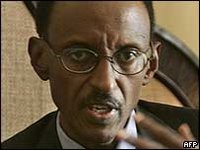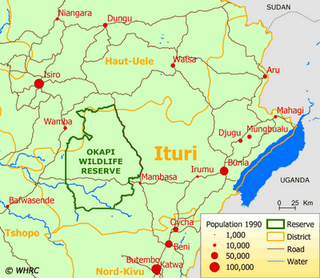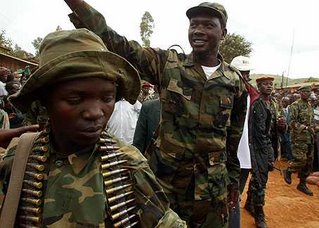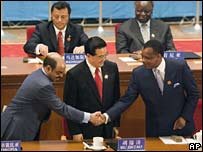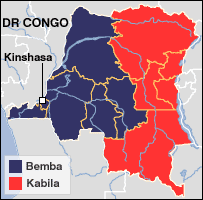 What other country can boast such diverse forms of crippling instability, all occuring simultaneously? If the Bemba fanatics in Kinshasa dont lynch you for speaking Swahili and supporting Kabila, Nkunda's men around Goma will gladly terminate you on suspicion of 'oppressing Tutsis'. And don't go seeking refuge in the wilds around Goma, as you're sure to get cooked by fresh lava flows from Mt. Nyamuragira, which erupted last night just outside of town.
What other country can boast such diverse forms of crippling instability, all occuring simultaneously? If the Bemba fanatics in Kinshasa dont lynch you for speaking Swahili and supporting Kabila, Nkunda's men around Goma will gladly terminate you on suspicion of 'oppressing Tutsis'. And don't go seeking refuge in the wilds around Goma, as you're sure to get cooked by fresh lava flows from Mt. Nyamuragira, which erupted last night just outside of town.Official election results were announced last night by Supreme Court officials in Kinshasa. They spoke under heavy armed guard from their temporary digs in the Ministry of the Interior, following last week's incendiary ravaging of the Supreme Court building by rabid Bemba supporters. Never has the thirst for lawlessness been more accurately expressed. Dont care for rule of law? Just burn down the Supreme Court.
In any other country, tanks would have flooded the streets in retaliation, and martial law immediately declared. In Kinshasa, police forces stood agape for a few reflective moments before the ravenous crowd of assailants, and promptly fled. UN peacekeepers arrived after the fact. The national army did not respond. Days later, Kabila formally asked Bemba to remove some of his estimated 1000-strong private army, of which around 60 were reported to have left the city. Congolese pundits blamed the international community for letting this 'blow to the heart and soul of Congo's national integrity' transpire uncontested, and in broad daylight. When will Congolese leaders assume the minimum of responsibility for their predicament?
From the BBC election graphic above one notes the clear division in voter preference between East and West, as though little mattered more than the geographical origin of the candidates themselves. Throughout their respective campaigns, neither candidate ever developed much in the way of political platform or agenda for reform. It was largely a high school popularity contest, costing the international community over $400 million. The cult of personality as the primary ingredient of political success in the Congo has changed little from the Mobutu era. Old habits, like dictators, die hard.
Now, Kabila has five years to address the country's problems, or will otherwise (one hopes) be voted out of office. Perhaps that in itself is worth all the effort, risk and cost of introducing democratic process to this country. Immediate benefits are intangible at this point.
On a different front here in the far East of the country, on the Rwandan border, the town of Goma has been on tenterhooks these last few days for very different reasons. Dissident general Laurent Nkunda of the national army has been rallying his forces to take the town of Sake, some 15 miles from Goma.

His apparent intention was to repeat his bloody takeover of Bukavu in June 2004. Then, UN peacekeepers stood by and watched, as the national army itself was crushed by Nkunda's powerful but limited number of men. This time, however, MONUC forces were intent on defending Goma, and spent much of yesterday reclaiming Sake and pursuing Nkunda's men with a combination of ground fire and helicopter gunships.
[displacements in Sake]
Nkunda's attack was reportedly triggered by the summary execution of a Tutsi man at a Sake checkpoint, a man with direct ties to Nkunda. Given Nkunda's pretense of defending his oppressed Tutsi brethren across eastern Congo, the murder provided a convenient pretext to begin military operations again, silent since August 2006.
Having been routed by MONUC forces, today the rumor is that Nkunda is ready to negotiate, although his exact terms and conditions are not clear. Amnesty for war crimes committed during his Bukavu invasion are likely among them.
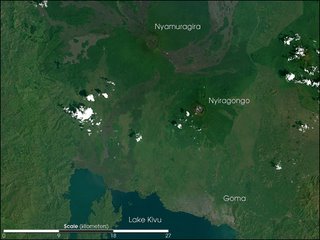
On a final front, just outside Goma at 8pm last night, Mt. Nyumalugira erupted, sending lava 150m into the night sky. There is no threat to the town or its residents, as happened with Nyiragongo in January 2002. Goma town was eviscerated, and thousands were displaced. Whether the gods are crazy, angry or celebrating current events in Congo, no one bothers to speculate. Brute life soldiers on.
[satellite image of Goma, Nyiragongo and Nyamuragira]
